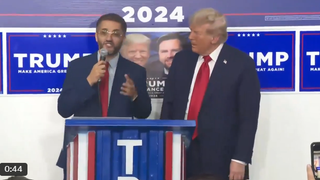Last month, the Trump campaign received an extraordinary gift in the swing state of Michigan – the endorsement of Amer Ghalib, the Democratic mayor of a Muslim-majority township bordering Detroit.
Ghalib, a 44-year-old immigrant from Yemen, blamed the Biden administration’s handling of the wars in the Middle East for his decision. Meeting with former president Donald Trump at a campaign event in Flint, Michigan on September 17 before making his endorsement, Ghalib said he has more faith in the Republican nominee to end the crisis.
“Trump and I may not agree on everything, but I know he is a man of principles,” said Ghalib of Trump – who notoriously implemented a “Muslim ban” on travel from several Muslim majority countries upon taking office in 2017.
Ghalib’s endorsement is a coup for Trump in Michigan, one of key swing states that will decide the US election. While Barack Obama won the state of 10 million handily by 450,000 votes in 2012, Trump scraped out a victory with only 10,704 more votes than Hillary Clinton in 2016. In 2020, President Joe Biden took it back from Trump by 154,188 votes.
With Michigan set to come down to the wire once again, its large Arab-American community could play an outsized role in determining the fortunes of the state. The crisis in the Middle East – while not a top concern for voters in swing states like Georgia and North Carolina still reeling from Hurricane Helene – could also be a deciding factor.
Home to 300,000 people of Middle Eastern and North African descent, Michigan is the heart of the Arab diaspora in the United States. For well over a hundred years, the state has absorbed successive waves of immigration from the Arab and Muslim world, beginning with Christian Levantine Arabs in the late 1800s, through to Shiite Muslim refugees who fled southern Lebanon during the Lebanese civil war in the 1980s, and more recent arrivals from Iraq and Syria today.
Democrats have historically enjoyed an advantage with Arab-American voters, yet anger over the Biden administration’s support for Israel and failure to secure a ceasefire in Gaza has eroded this support, turning the community into swing voters in a swing state.
Arab Americans undoubtedly helped deliver Michigan to Biden in 2020 – with Amer Ghalib’s own township of Hamtramck voting overwhelmingly for Biden over Trump with 6651 to 1043 of the vote. But a new poll from the Arab American Institute shows Trump and Harris now neck and neck with Arab Americans voters nationally at 42 per cent to 41 per cent. The poll also revealed low enthusiasm for Harris, who is 18 points behind where Biden was polling with Arab American voters at this point in the 2020 race.
The war has presented a minefield for both campaigns as they try to cobble together the swing states needed to clinch the White House – and manage the competing demands of their electorates.
While Harris has taken pains to thread the needle on the Middle East, the wars in Gaza and Lebanon have exposed deep stress fractures in the party between more centrist pro-Israel Democrats and the progressive and more pro-Palestinian wing of the party.
While an estimated 100,000 Jews live in Michigan, Harris also needs to win over urban progressives, minorities and young people, the latter who are decidedly more sympathetic to the Palestinian cause and led rolling, often violent protests on college campuses over the past year. A decision by the state’s Jewish Attorney General Dana Nessel – a Democrat – to level criminal charges at 11 pro-Palestinian protesters who refused to vacate a tent encampment at the University of Michigan early this year laid bare the internecine tensions in the party. Congresswoman Rashida Tlaib – Michigan’s own member of the progressive “Squad” group – accused Nessel of “bias” in pursuing the prosecution because of her Jewish identity; Nessel in turn accused Tlaib, a Palestinian-American of “antisemitism”.
On foreign policy in the Middle East, Trump has also had to chart a delicate course between courting Arab-American minorities – including Iraqi and Lebanese Christians more receptive to a bellicose stance on Iran and its regional proxies – and the isolationist wing of his party. This includes white working-class voters in Michigan – home to America’s auto industry – who are tired of seeing US blood and treasure spent in wars overseas.
Trump has peddled a somewhat ambiguous, opportunistic line on the Middle East crisis; declaring that it never would have happened on his watch while decreeing himself the best option to fix it.
As Harris has equivocated on Gaza, Trump has capitalised on an opportunity to pick off Arab-American voters angry over the Biden’s administration’s response, enlisting the help of his daughter Tiffany’s Lebanese-American father-in-law, Massad Boulos, in outreach in Michigan. Boulos has reportedly delivered, helping to shepherd Trump’s fortuitous meeting with Ghalib before his campaign event in Flint last month.
“He knew a lot about me before the meeting,” Ghalib said in a text message to The Detroit News, after holding court with Trump. “We talked about various topics including the debates, the polls updates, the statistics of votes in Michigan and Wayne County, the Arab American concerns and the Yemeni Americans in particular.”
Describing the meeting in more frank terms on Facebook later, Ghalib wrote in Arabic:
“Did I leave with promises that he will deliver on our requests? Of course not.
“Trump showed that he understood the issue, and [showed] respect for us.”







